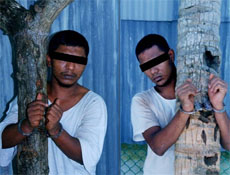Dhivehi Rayyithunge Party (DRP) MP Rozaina Adam has said that invoices from the former presidential palace Theemuge she leaked through Twitter on Friday were “just a few among thousands” at the parliament’s Finance Committee.
In a press statement issued in response to former President Maumoon Abdul Gayoom’s attorney denying wrongdoing by the Gayoom family, the DRP MP for Thulusdhoo noted that the former president’s lawyer had neither contested the authenticity of the bills and invoices nor denied that the expenses were made out of the Theemuge budget.
Gayoom’s lawyer Ibrahim Waheed had insisted in a press statement on Sunday that all expenditure out of the presidential palace was “in accordance with the rules and regulations” as parliament had approved the funds for the palace.
However, Auditor General Niyaz Ibrahim told newspaper Haveeru today that the state should recover funds used by former presidents on their families and associates. Lack of legislation explicitly prohibiting such expenses was not an obstacle to recovering the misappropriated funds, the Auditor General contended.
He noted that there was no law that authorised the use of public funds for personal expenses, adding that assistance from state funds should be provided on an equal and fair basis.
“Even if its Nasheed, Waheed or Maumoon, no one can spend state funds for their own personal use,” Niyaz was quoted as saying.
While the Theemuge audit report for 2007 and 2008 was released in April 2009, Rozaina meanwhile explained that the Auditor General’s Office sent bills from the former presidential palace to the parliament’s powerful public accounts oversight committee in 2012.
The damning audit report revealed that extravagant expenses for the Gayoom family were made out of the Theemuge Welfare Fund, earmarked for helping the poor.
In addition to the invoices she posted on Friday, Rozaina revealed that documents at the committee showed that former First Lady Nasreena Ibrahim took US$50,000 in cash during a trip to Dubai on May 6, 2007.
In her statement, Rozaina noted the expenses she exposed on Friday in Maldivian Rufiya: MVR193,209 on trouser material in 2008; MVR116,373 for Gayoom’s daughter Yumna Maumoon’s stay in Singapore’s Grand Hyatt Hotel in 2007; MVR364,958 for Yumna’s stay at the same hotel during the previous year; MVR202,096 for Yumna’s husband Nadeem, Gayoom’s son Gassan Maumoon and his wife Swineetha’s stay in the hotel; and over MVR29,000 for Gassan’s spectacles.
On Waheed’s claim that the expenses were lawful, Rozaina noted that the former Auditor General had recommended recovering the funds used by Gayoom’s family and associates and pressing charges against the former president for misappropriation of public funds.
The audit report had noted that over US$ 3 million earmarked for helping the poor was spent on “the president’s relatives, ministers and their families, senior government officials and some MPs.”
The report stated that 49 percent of the palace’s budget, equivalent to MVR 48.2 million (US$3,750,000 at the time), was diverted from the budget for the poor in 2007 and 52 percent, MVR 44.9 million (US$3,500,000), in 2008.
Rozaina meanwhile went on to say that she believed the public should know of the extravagant spending by the former president’s family, as it was done at a time when a large number of Maldivian citizens displaced by the tsunami were living in temporary shelters.
The family’s shopping sprees in London and stays in expensive hotels in Singapore could have paid for a number of infrastructure projects in her constituency alone, Rozaina noted, such as building classrooms in Kaafu Huraa or establishing sewerage systems in Kaafu Thulusdhoo, Himmafushi and Dhiffushi.

